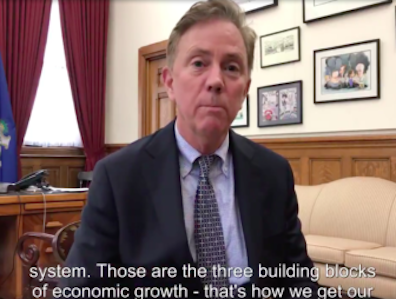Lamont Administration Struggles, Admits ‘Room for Improvement’

Audio By Carbonatix

Gov. Ned Lamont in a Twitter video with subtitles about his focus on economic development. CTMirror.org
As Gov. Ned Lamont prepares to propose his first budget on Wednesday, Saturday’s news drop of a highway tolling plan is being viewed as just one example of a miscue by the new administration.
By Mark Pazniokas, CTMirror.org
Gov. Ned Lamont’s evident lack of a strategy to promote, defend, and win passage of the highway tolling plan he abruptly dropped on Connecticut over the long holiday weekend rattled Democratic allies Tuesday and raised new questions about the young administration’s political and legislative acumen.
Three days after Lamont reversed himself and endorsed tolls for all motor vehicles – not just trucks, as promised during his campaign – his administration has provided no specifics or talking points to legislative allies, nor dispatched any surrogates to campaign on behalf of what quickly became a Twitter and talk-radio piñata.
His “Day One” plan was to outline his reversal in an op-ed piece published Saturday by Hearst Connecticut Media, email the article to reporters, and post a brief video on Twitter. What became clear Tuesday is that there was no “Day Two” plan, ceding the Sunday, Monday, and Tuesday news cycles to a rapidly mobilized opposition of Republicans, the trucking industry, and small businesses.
“We were waiting,” said J.R. Romano, the Republican state chairman.
What was broadly seen as a botched roll out of a major early policy initiative raises the stakes Wednesday for Lamont’s first budget address to the General Assembly, when he intends to frame his vision for stabilizing Connecticut’s budget, not just explain the financing for the maintenance and improvement of an inadequate highway system and transit network.
His staff and legislative supporters of tolls said Tuesday they expect the governor to learn from his difficult weekend, despite the special resonance in politics of the old saying, “You get only once chance to make a first impression.”
“There’s always room for improvement,” said Colleen Flanagan Johnson, the governor’s senior adviser. “And this is a new legislature. This is a new governor. This is a new staff.”
But the miscue is not the first in Lamont’s six weeks in office. Lamont flailed for two weeks after CT Mirror reported Jan. 28 that the governor’s budget office was considering a plan to extend the sales tax to groceries, prescription drugs, and other long-exempt items. It sparked a similar outcry.
A week later, Lamont told Hearst that the groceries tax was not in the top 50 of options, then he told CT Mirror it was one of 100. Finally, on Feb. 11, Lamont told The Hartford Courant that not only was the groceries tax dead, “It was never alive.”
“Let’s put it that way,” Lamont said. “We’ve investigated every single option, and that was one of the options that we discarded very early on.”
That was disingenuous, at best. It was very much alive when CT Mirror approached his senior staff, just prior to publishing the story exactly two weeks earlier.
Last week, Connecticut AFL-CIO President Sal Luciano said he was confident that Lamont would not be demanding concessions from state employees, an assertion that went unchallenged by the administration.
On Tuesday, the administration proved him wrong. announcing it would seek savings from future retirees of more than $13o million a year.
Roy Occhiogrosso, the top adviser and political strategist for Gov. Dannel P. Malloy, said growing pains are inevitable for a new administration and communication mistakes can occur at any time.
“I can tell you, stuff happens,” said Occhiogrosso, the author of a line in a speech that outraged teachers and nearly derailed Malloy’s education reform efforts in his second year. “The question isn’t are you perfect or will you never make a mistake. The question is can you recover from it and can you learn from it.”
Democratic legislators, who won strong majorities in both chambers of the General Assembly in 2018, said they believe the administration can learn from its mistakes, but the mistakes they are making are evidence of a staff without deep roots in the General Assembly.
“I’ll take the benevolent view, and say they are still learning,” said Sen. John Fonfara, D-Hartford, co-chair of the Finance, Revenue and Bonding Committee. “I’d rather see it through that lens, that it’s a big job, and they are doing their homework and at some point they’ll be up to speed and have conversations that are very meaningful.”
Fonfara said the governor’s staff has much to learn about the legislative process, not just legislative issues. He said he is trying to be patient.
“It’s easy to be critical or say they don’t know what they are doing. That’s easy. I choose to see it as they have a lot of homework to do, and they are doing it,” Fonara said. But he also added, “Could they have done better in hiring people with more experience here? Yes, I would agree with that.”
Legislators said Tuesday the administration shared Lamont’s op-ed piece, but were not ready with the type of localized talking points that can help lawmakers sell a governor’s proposal to constituents, such as better parking at a commuter rail station or a highway redesign eliminating a traffic bottleneck.
Sen. Matt Lesser, D-Middletown, said he reached out to the administration and came away empty. His district includes a section of Route 9 that is a limited access highway, except for a traffic light in Middletown that is the source of frequent traffic tie-ups. The Malloy administration proposed a fix two years ago.
“I think the more information we have, the better we can explain this to our constituents,” said Rep. Jeffrey A. Currey, D-East Hartford. “This morning, folks within the Manchester delegation attended a small business town hall, and tolls was one of the items that came up. It is potentially going to impact the movement of their goods.”
Opponents of tolling already had distributed information on what they say would be the costs tolls will impose on local businesses. Currey said they did not have the data to rebut them.
“I think a lot of their team is finding their footing,” Currey said of the Lamont administration. “I think it would be beneficial if there was additional reaching out to those of us us in the legislative branch, maybe we could help them.”
Sen. Mae Flexer, D-Killingly, whose district is on the border with Rhode Island, said she had the same position as Lamont on tolls during the campaign: She was in favor of tolls on trucks, not cars.
“I can appreciate that Gov. Lamont came in and was given a wider set of information and came to the conclusion we need to have a broader conversation about tolls,” Flexer said.
Romano, the GOP state chairman, said Republicans assumed during the campaign that Lamont would seek tolls on all vehicles, not just trucks.
“Once again, Republicans were proven right,” he said. “What’s even scarier is Ned Lamont is shocked at the dismay of so many taxpayers in this state over this issue. It goes to show how out of touch he is to the average voter, the average family in this state.”
Democratic State Chairwoman Nancy Wyman, the former lieutenant governor and comptroller, defended Lamont’s reveals on tolls, which the governor attributed to a realization that trucks-only tolling would not produce sufficient revenue to maintain and modernize Connecticut’s infrastructure.
“I think the governor realized what had to be done, and he decided to come out and tell everybody right away,” she said.
Wyman said Lamont has worked hard to develop a relationship with lawmakers, inviting small groups to the Executive Residence.
Flanagan Johnson said that outreach will continue.
“He’s interested in learning more about the legislature, more about their interests, the things that make them tick,” she said. “I hope that they want to learn more about what makes him tick. So, it’s a relationship in progress.”
Reprinted with permission of The Connecticut Mirror. The author can be reached at [email protected].
Like what you see here? Click here to subscribe to We-Ha’s newsletter so you’ll always be in the know about what’s happening in West Hartford!



